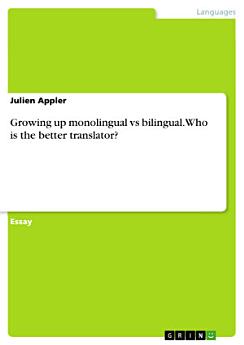Growing up monolingual vs bilingual. Who is the better translator?
Sep 2016 · GRIN Verlag
Ebook
13
Pages
family_home
Eligible
info
reportRatings and reviews aren’t verified Learn More
About this ebook
Essay from the year 2015 in the subject Interpreting / Translating , grade: 2,0, University of Heidelberg (IUED), course: Übersetzungswissenschaft, language: English, abstract: At the IUED at Heidelberg University, many different students from all over the world gather to learn and improve their translation abilities. This is probably one of the places with the most students who grew up bilingual studying together. However, there are not only students who grew up bilingual, but also students who grew up monolingual. After studying for some time, most of the students ask the question: Who is the better translator? There are several assumptions about growing up bilingual, positive ones as well as negative ones. Every single one can be found on the internet posted by people worrying about their own children or other children, and it can also be found in various books about the matter. One of those assumptions is also " Children who grow up bilingual will make great translators when they grow up", so it is a legitimate question to ask, who is better – students who grew up bilingual, or students who grew up monolingual and learned a second language later in life? To investigate this matter, many questions have to be analyzed. The main question is about the issue of growing up mono- or bilingual and becoming a translator. In order to analyze this question, it is best to divide the analysis into several sub-points. The first point addresses the following areas: the definition of mono- and bilingual, the brain activity and development of children who grew up monolingual compared to children who grew up bilingual, the pedagogical question of how children learn, how adults learn, and do children really learn languages better and faster than adults; and if no, how can adults have the same learning success as children. The second regards the translator: What does it mean to be a translator and what abilities are important to be one? Is it enough to know languages just as a foreigner, or does the translator have to be a native speaker of both languages he or she translates?
About the author
Julien Appler beendete sein Studium an der Universität Heidelberg und unterrichtet heute Sprache und Kultur. Nach seiner Ausbildung zum Schauspieler war er stets auf der Suche Verständnis und Kommunikation auf dem bestmöglichen Weg zu vermitteln. Er engagiert sich sozial für Kinder und Jugendliche, um ihre Chancen auf dem Arbeitsmarkt zu verbessern und hat bereits mehrere Arbeiten zum Thema Kulturverständnis und Übersetzung publiziert. Sein besonderes Interesse gilt dem vereinfachen von Lernprozessen. Julien Appler lebt in Mannheim, einer Stadt der er sich mit Leib und Seele verschrieben hat.
Rate this ebook
Tell us what you think.
Reading information
Smartphones and tablets
Install the Google Play Books app for Android and iPad/iPhone. It syncs automatically with your account and allows you to read online or offline wherever you are.
Laptops and computers
You can listen to audiobooks purchased on Google Play using your computer's web browser.
eReaders and other devices
To read on e-ink devices like Kobo eReaders, you'll need to download a file and transfer it to your device. Follow the detailed Help Center instructions to transfer the files to supported eReaders.





